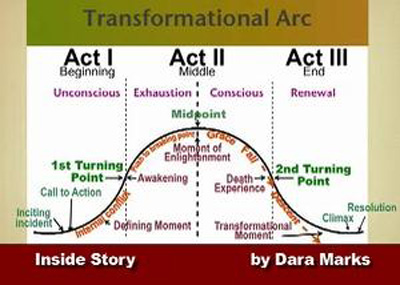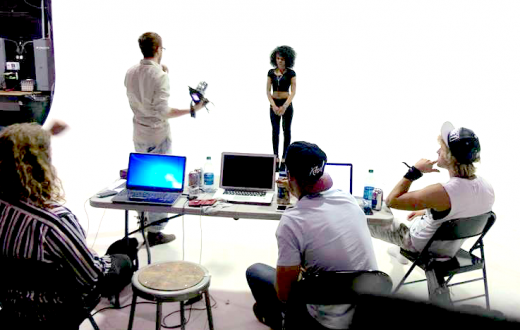Like magic, successful writers pull off a third act in their stories that creates a lasting impression on their audience. So how do you get to that level of writing greatness?
You weave in a very organic, period of Grace.
This to me is the value of looking at the Transformational Arc, says Dara Marks who helped NYCastings writers understand the importance of transforming characters through her signature tool, the Transformational Arc, in Part One and Part Two of this article.
Dara Marks explained the benefit of making conscious choices and having the character’s old consciousness giving way to new consciousness – in Part One and Part Two of this feature article. Yet she believes that part of the arc is pretty standard.
Nothing I’ve said so far will completely shock someone – that a story is more powerful when there is an internal movement of character, shares Dara. The question becomes how to move the character internally because a lot of people will intuit the necessity of putting this into the story but when it gets down to it, all they really do is create a character with a psychological problem in the beginning and somehow, in the end, that psychological problem has changed.
For example, let’s say something as simplistic as sobriety – they are drunk in the beginning and somehow magically, by the end, they give up the bottle. What the arc says is – NO – that there are organic, natural steps in this process and the arc spells out exactly what these organic movements are. But that only comes after a shift of consciousness, says Dara, in that the first half of the story is an inability to get to this state of consciousness.
A problem is a problem because we don’t know how to solve it. So when you are putting an internal conflict into a story you can’t just put it in and then magically solve it within the first thirty pages because then you have no more story to tell, says Dara. In our natural human existence, we don’t grow and change until what we are doing wears out its ineffectiveness. I refer to it as a fatal flaw, a survival system that has outlived its usefulness.
In our culture we tend to believe that the greatest way to act is to go out and face our problems and to relentlessly do it,’ says Dara. I think, that if you examine periods of growth in your life you will see that we don’t just do it.’ It isn’t until the systems have broken down and have crashed around us, when we are in fact at our most vulnerable point where the new thing has the ability to break into consciousness.
When moving a character internally, there is a big struggle in the first half of the story to get up to the peak of the arc to where this new level of consciousness can break through, says Dara. It is a very exhausting process and therefore, what happens after the breakthrough is a period of re-energization.
You are reenergized, and that is what causes the new period of grace. The new energy causes the protagonist to see things more clearly, to feel better then they have ever felt, to take actions that they haven’t had the courage to take before, to open their heart and love in a way they haven’t before – whatever it is in the story. Suddenly, you get a burst of that in the midpoint of the story and it has a powerful affect on the story because it shows us the potential of can happen if the protagonist can really get to the goal, that this way of being in the world can really be achieved.
This moment of the arc also shows that the moment of enlightenment, where the new idea breaks through, is not transformation. It is merely the doorway through which the transformation begins, says Dara. And then, we go through the second half of the story and have the biggest fight ever for the protagonist around the second turning point.
The climax, in the end, represents the struggle – that transformational change is not simply new consciousness, it is new conscious backed by conscious action. That is where you get the transformational moment,’ where the protagonist makes a commitment to act in this new way. That is where you see change really occur.
Using this Transformational Arc is powerful for writers, because instead of coming into the second act feeling like Oh my God, I have seventy pages of an arid desert to cross’ – instead, you understand what needs to be achieved in that second act, internally. There is so much power in that.
To me, shares Dara Marks, if everything is working – get out of the way. But when you are lost in an idea, or lost in a story, it doesn’t mean that you don’t have a good story to tell – it just means it’s a little harder to tap into.
In some cases, tapping into a hard to figure out original concept can lead to something greater.
Sometimes, it may mean that you are getting into something even greater and you don’t want to discount it, says Dara. If you don’t have methodology for asking yourself the right creative questions, you are floundering in this vast creative world where you are not really focusing on what is going on. So when you understand the arc, and what is happening at each segment of the script, it’s not a fill in the blanks process.
The Transformational Arc is just asking you to focus on creatively asking yourself the right questions and those questions may lead to a tough decision for a writer because the arc often reflects, a sacrifice.
We have a hard time with this within our culture, shares Dara. We want to believe that we get everything for nothing and we don’t. There are sacrifices that have to be made. When you deal with a strong coming of age story, for example, there is a lot of sense of loss but without that loss there is no gain.
If you look at a movie as powerful as Dead Poets Society, these boys lost their innocence. But without that loss of innocence, they couldn’t move forward to become men.
We have a culture that worships innocence and yet innocence is really non transformational, says Dara. Anyone who remains at the level of complete innocence becomes prey; they become a potential victim for those who would take advantage. So, when there is a loss of innocence, there is also a gaining of wisdom and a gaining of the ability to be present in the world, to care for oneself in the world and to be able to fully care for others.
Staying stuck at a level of innocence is a trap. If you look at fairytales even, something as simple as Little Red Riding Hood, in her innocent state she was easily a victim of the Big Bad Wolf because she couldn’t tell the difference between a Big Bad Wolf and anything else.
Having your protagonist face the toughest moments and make a lasting change sounds a lot like psychology for your character, or life coaching – and in a way it is.
I am sure that is where a lot of this comes from, for me, shares Dara. In order for me to have a belief in something that I teach, or use in my work, it has to pass a truthful test for me. Is this what I experience? Is this what my friends experience? Is this what I see around me? If it is simply that on page 25 there is a turning point, I don’t see evidence of that in my life. I have to find a way to feel it, and understand it, in terms of what I really know to be true.
In the Transformational Arc, Dara refers to this stage of loss / major change as a death experience.
It is a good place for a death to occur because it is symbolic, says Dara, but what it is really calling attention to is that transformational change has to give death to the old way old being and birth to the new way of being.
If you tell a story from the moment of enlightenment forward, where the protagonist totally gets it and everything is done, then it also undermines what we know as true. Life isn’t as simple as that.
Going back to something as easy as the alcoholic, says Dara, they may be able to stay sober when everything is working out for them. But how do they stay sober when things become hard or difficult?
Until someone has gone through a trial of something difficult and maintained their sobriety, there is no other real evidence that they are sober. You can put up a shingle and say you are sober – but until it is tested, you don’t know what you are really made of.
And this is true for love and everything else. It is one thing to fall in love and to give yourself to somebody when things are wonderful and happy. But when things get tough, do you really have the ability to love unconditionally? To go to the dark places with the other or is your love only at the level of – as long as all is good, I will be here.
To me, that is the power of the transformational moment. As opposed to heading into a climax and fighting for the sake of fighting, they are fighting for commitment to something. Heading into that feels as if they have reached what they are struggling for in the story.
When you create this second turning point, this moment that pays off for the protagonist and audience, someone will read it and say, there is something about this movie that really rung my bell, that really made me feel something.’ So, I don’t believe it’s about hitting a level of perfection. I believe its about hitting a level of truth, a commitment to that truth, and I think everyone is capable of doing it.
Dara Marks believes that every writer can create a really good story and part of that creative process includes getting your story in front of others.
Artists, throughout the history of the world, have just wanted to do our art and be left alone, says Dara. But part of the process is getting it out in the world.
That was step three (from Part One of this article) – expressing it out into the world.
As a writer and an artist, you need get your work seen, and not limit yourself, says Dara Marks.
Just as your protagonist must truthfully face their flaws and push through them, you have got to go out and fight, for what you’ve worked on and believe in.
Hopefully this three part article has provided both insight and motivation for NYCastings writers.
For more guidance from the legendary Dara Marks, check out INSIDE STORY: The Power of the Transformational Arc. www.daramarks.com/inside.php







